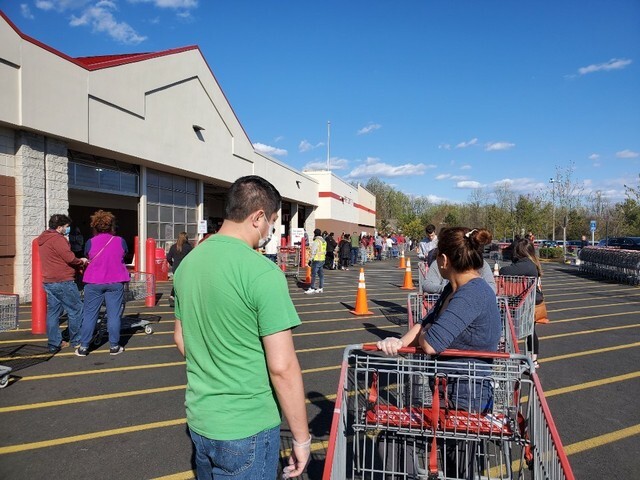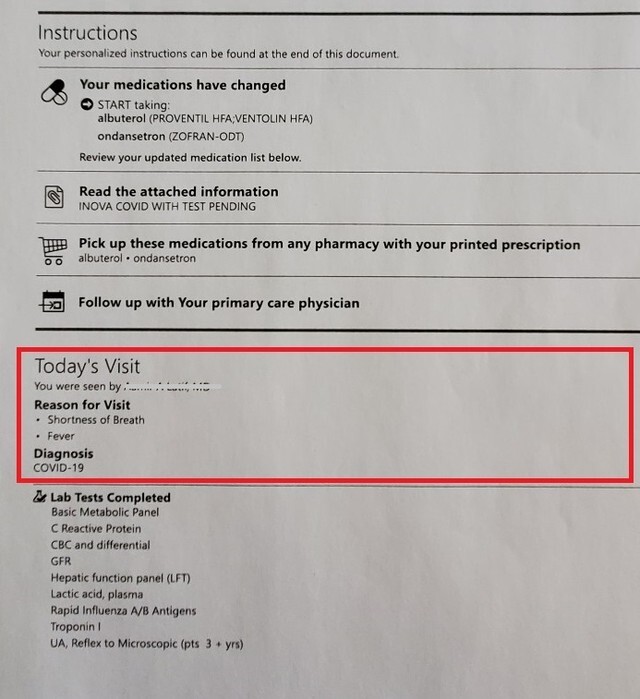hankyoreh
Links to other country sites 다른 나라 사이트 링크
[Interview] Americans can’t get tested or treated for COVID-19 unless in serious to critical condition

“K” is a 64-year-old Korean who runs a business in Fairfax County, Virginia. He felt a pang of fear when his wife, a 64-year-old nurse, came down with a fever and exhibited cold-like symptoms on Mar. 30. Four days before her symptoms appeared, a 90-year-old woman in his wife’s care had tested positive for the coronavirus.
K’s fears soon proved true. One week ago, his wife also tested positive at a community health center in the area. The subsequent days have been a difficult time for K’s family. Despite her labored breathing and high fever, his wife still hasn’t been admitted to a hospital, and K and his children haven’t been able to get tested, either.
“The situation on the ground here is grim. A significant number of patients and people they’ve contacted can’t get proper treatment or even testing for COVID-19,” K told the Hankyoreh in a telephone interview on Apr. 8. As of Wednesday, around 390,000 Americans had been diagnosed with COVID-19, and over 12,000 had died of the disease.
When K’s wife showed worsening symptoms on Apr. 2, he hurried to contact the US Centers for Disease Control and Prevention and the regional health authorities, but it wasn’t easy to arrange a test. There wasn’t enough testing equipment to test just anyone, he was told, so his wife would have to get a note from her doctor showing that she was suspected of having COVID-19.
But K was nervous about how long it would take to sort out the necessary documentation. When he told the health authorities that there were COVID-19 patients at the hospital where his wife works, he was finally told to visit the community health center.
In the end, K’s wife was tested for the coronavirus in a drive-thru screening center in the parking lot in front of the community health center. One day later, she was informed by phone that her test had come back positive, but no further action was taken. “The community health center didn’t prescribe her any medicine and just told her to quarantine herself at home for a week,” K said. Local hospitals in the US are limiting the admission of COVID-19 patients to those in critical condition.
After K’s wife tested positive, K was worried that he and his children might get infected as well, but his neighborhood doctor was reluctant to provide him with the necessary documentation. Even if you’re spending time with a patient, he was told, it’s hard to get a test without presenting symptoms.
But as the days passed, K saw his wife’s symptoms — including her high fever and labored breathing — get worse. He was particularly troubled by the fact that she’d had an operation for a heart condition three years ago.
On Apr. 5, K finally called 911 and had his wife taken to the hospital. She had to ride alone in the ambulance, and she was discharged the same day she visited the emergency room. Despite her medical history, including the operation, the doctors said she couldn’t be hospitalized because her oxygen saturation level was close to normal. Fortunately, her symptoms have gradually improved since she returned home, but K is still struggling to relax.
K and his family have quarantined themselves at home for the past week. He and his wife stay in separate rooms and only see each other when he brings her meals. Their two children, who are both college students, are sharing a room in the basement. Family communication takes place via mobile phone.

K’s family is also having trouble obtaining medical supplies and even basic necessities, because of the panic buying that has swept the US during the COVID-19 pandemic. “When I went to the supermarket to buy groceries two weeks ago, I had to wait an hour and a half just to get inside. There are times when I can’t find flour or chicken, and basic medical necessities like Tylenol, hand sanitizer, and thermometers are even harder to come by,” K related.
“My family is voluntarily abiding by the quarantine rules, but disease control authorities aren’t doing any kind of monitoring. It doesn’t seem like contact tracing is being done for patients in any systematic way,” K said.
“Even the medical staff at the hospital where my wife works aren’t provided enough face masks. While my wife was still working, before she got sick, she heard that some people were covering their mouths with strips of diapers or tissue paper.”
By Park Jun-yong, staff reporter
Please direct comments or questions to [english@hani.co.kr]
Editorial・opinion
![[Column] Welcome to the president’s pity party [Column] Welcome to the president’s pity party](https://flexible.img.hani.co.kr/flexible/normal/500/300/imgdb/original/2024/0515/3917157400447943.jpg) [Column] Welcome to the president’s pity party
[Column] Welcome to the president’s pity party![[Editorial] Korea must respond firmly to Japan’s attempt to usurp Line [Editorial] Korea must respond firmly to Japan’s attempt to usurp Line](https://flexible.img.hani.co.kr/flexible/normal/500/300/imgdb/original/2024/0514/2317156736305813.jpg) [Editorial] Korea must respond firmly to Japan’s attempt to usurp Line
[Editorial] Korea must respond firmly to Japan’s attempt to usurp Line- [Editorial] Transfers of prosecutors investigating Korea’s first lady send chilling message
- [Column] Will Seoul’s ties with Moscow really recover on their own?
- [Column] Samsung’s ‘lost decade’ and Lee Jae-yong’s mismatched chopsticks
- [Correspondent’s column] The real reason the US is worried about Chinese ‘overcapacity’
- [Editorial] Yoon’s gesture at communication only highlights his reluctance to change
- [Editorial] Perilous stakes of Trump’s rhetoric around US troop pullout from Korea
- [Guest essay] Preventing Korean Peninsula from becoming front line of new cold war
- [Column] The state is back — but is it in business?
Most viewed articles
- 1[Column] Welcome to the president’s pity party
- 2[Editorial] Transfers of prosecutors investigating Korea’s first lady send chilling message
- 3Could Korea’s Naver lose control of Line to Japan?
- 4[Editorial] Korea must respond firmly to Japan’s attempt to usurp Line
- 5Major personnel shuffle reassigns prosecutors leading investigations into Korea’s first lady
- 6Second suspect nabbed for gruesome murder of Korean in Thailand, 1 remains at large
- 7Korea cedes No. 1 spot in overall shipbuilding competitiveness to China
- 8[Column] Will Seoul’s ties with Moscow really recover on their own?
- 9US has always pulled troops from Korea unilaterally — is Yoon prepared for it to happen again?
- 10[Correspondent’s column] The real reason the US is worried about Chinese ‘overcapacity’